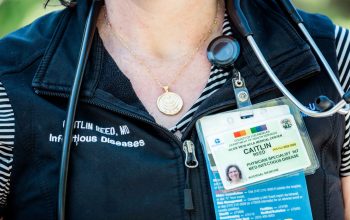Anna Dodson ’18 leads NC AHEC project to help health professionals reenter workforce

When the UNC School of Medicine suspended hospital rotations for medical students in March due to projected PPE shortages and other safety concerns, Anna Dodson ’18 lost no time in changing plans.
Anna contacted the North Carolina Area Health Education Centers (NC AHEC) Program, a partner of Carolina, to ask how she might redirect her efforts during the crisis to make an impact.
“I really got to thinking about what skills I already have and how those might be leveraged during this time of waiting,” said the alumna, who received her undergraduate degree in health policy and management from UNC Gillings School of Global Public Health.
As a result, NC AHEC matched Anna with Nathan Nelson-Maney, a fellow MD-PhD student at the UNC School of Medicine. The two now co-lead the Surge Provider Guidelines Team, a project that seeks to help health professionals prepare to reenter the workforce.
Their Workforce Surge Planning Playbooks, a collection of guidelines, self-study tools, and other resources, are designed to help those interested in working in critical care, general in-patient medical care, ambulatory (outpatient) care, home-based care, and long-term care within North Carolina.
Anna said that while Chapel Hill has a robust healthcare workforce through UNC Health, the coronavirus has accentuated severe healthcare disparities for underserved parts of the state.
“Those healthcare systems were already strapped prior to this pandemic and are now facing even more demands,” said Anna, whose research focuses on the intersection of healthcare policy and access to services for rural populations. “In these communities, we’re seeing a much greater need for and response to these playbooks among people who may have retired, taken leaves of absence, or don’t have a lot of experience but want to help at some fundamental level.”
In the months ahead, the team will work with Carolina’s Cecil G. Sheps Center for Health Services Research to position the five existing playbooks for implementation nationwide.
As states vacillate between reopening to salvage faltering economies and maintaining stringent measures for the sake of public health, Anna said she hopes that a cautionary approach prevails.
“It’s really important for us, as we’re weighing the cost of these decisions, that we don’t fail to consider the mental, emotional, and spiritual cost of lives lost, because that is what’s really at stake if we make rash decisions,” she said, noting the significant impact the coronavirus has had on American businesses and workers.
Following her graduation from the medical school in May 2022, Anna said she hopes to return to her hometown of Bunn, North Carolina (comprising a population of around 400 people), or a similar rural area, to work in primary care within family medicine.
While her short-term plans have altered course due to COVID-19, the new reality has also reinforced her long-term goal of joining a national lobbying effort and working with government agencies to effect higher-level change for underserved populations.
“What this pandemic has illuminated for a lot of people in the United States is that we often fail to invest in public health and preventive measures,” she said. “We can’t put in place perfect prevention for a novel disease, but we can invest in infectious disease efforts at the national level and develop robust public health structures that are better able to respond when crises happen.”

The team also includes medical student Emma Astrike-Davis ’18, whose research focuses on rheumatology and social health disparities at the UNC School of Medicine.
NC AHEC provides educational programs and services in partnership with academic institutions and other organizations in North Carolina. The program’s mission focuses on expanding primary care in rural communities.



